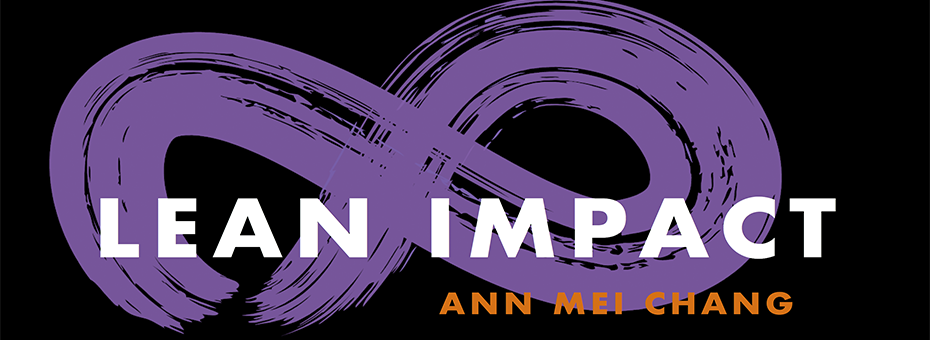As senior engineering director at Google, Ann Mei Chang led worldwide engineering for mobile applications and services, delivering 20x growth to $1 billion in annual revenues in three years.
When she pivoted to the social change sector, she brought an engineer’s perspective on innovation and experimentation to the work of making the planet a better place. Her recent book Lean Impact: How to Innovate for Radically Greater Social Good shows how the scientific method and Lean Startup practices help mission-driven organizations scale up the social impact of their work, time, and money. She talked with LEI’s Chet Marchwinski after her keynote at the 2019 Lean Summit.
Q: ‘Insanely great’ was the term Steve Jobs used when talking about Apple products. Is it fair to say you want to create insanely great social impact?
Ann Mei: Absolutely. I think we already take it for granted that companies aim to maximize their profits, maximize their shareholder value. Everybody works relentlessly to try to get there. I think we need to apply that same spirit to social impact. It’s not enough for us to deliver some impact and do some good. We really should do everything possible to deliver the greatest impact at the greatest scale because the scope of the needs that exist in the world are really extensive.“It’s not enough for us to deliver some impact and do some good. We really should do everything possible to deliver the greatest impact at the greatest scale because the scope of the needs that exist in the world are really extensive.”
Q: That’s a good point. What’s the difference between the approach described in Lean Impact and the way mission-driven organizations such as nonprofits, foundations, and philanthropies operate traditionally?
Ann Mei: I think the biggest difference is that organizations in the social sector have a difficult time taking risks. The tendency is to plan their programs in excruciating detail in advance within a grant proposal and then execute to that plan.
That works when you have a solution that really works and is able to scale and meet the needs that exist in the world, but for most of the things we’re trying to tackle in the social sector, that’s just not really the case. We have a lot of unanswered questions where our solutions are often insufficient.
We need to figure out how to take much greater risks. That means experimenting, trying a lot of different things, learning from that and being able to iterate very quickly and learn as quickly as possible to get to the solutions that really will meet the needs that exist.
Q: Sticking with that point, you draw inspiration from the Lean Startup movement and the scientific method of build-measure-learn. Can you explain how these and other concepts are synthesized in the book?
Ann Mei: Lean Startup and Lean Impact are not just fads. They really are rooted in the fundamentals of the scientific method. The idea is that when we have a potential solution to a problem, we form a hypothesis about what we think will happen.
The build-measure-learn feedback loop is simply that we build an experiment, something Eric calls an MVP or minimum viable product. That’s the smallest, cheapest possible experiment that will help you learn about the hypothesis. Then we measure and gather data to see what happened, and then we learn.
If we discover that our solution worked, then maybe it’s safe to double down. If we discover that it didn’t work, we can learn about whether there might be ways we can tweak it to work better or whether we may be off-track altogether and need to pivot and take a different course.
All organizations go through this build-measure-learn feedback loop, but the key is how fast we can go through the loop. I think a lot of mission-driven organizations tend to do pilots and gather data and learn during months or years. We want to reduce that down to days or weeks because when we can learn faster, we can make much faster progress.
Q: Can you share some results about the accelerated impact from this approach?
Ann Mei: Absolutely. I interviewed organizations, both nonprofit and for-profit, small and big, domestic and international from across all different sectors. What I’ve seen is that when organizations are able to break out of the planning and doing mentality and really start taking on an experimental mentality, they’re able to dramatically increase their impact.
Organizations like Summit Public Schools iterated and improved on their approach to personalized learning to deliver dramatically better results in terms of college graduation rates. An organization in South Africa called Harambee Youth Employment Accelerator is working on youth employment issues and tackling the scourge of youth unemployment and iterating their way to figure out how to reach over 50,000 youth and get them to find their first formal sector job.
Keep Learning:
- Applying “Lean” Innovations for Social Good at the Yale School of Management’s Program on Social Enterprise;
- Read Lean Impact.





